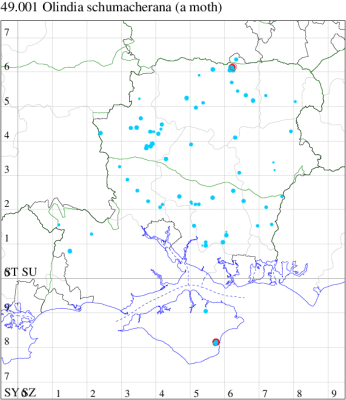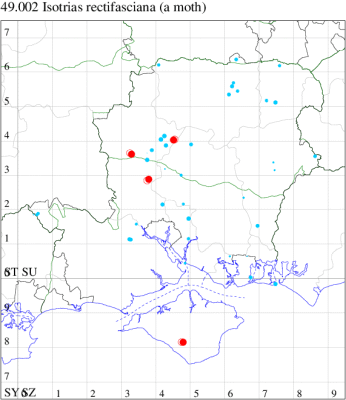2020 Annual Report for: Tortricidae / Chlidanotinae
For species seen in 2020 that had less than or equal to 100 records, full details are included; for more common species, the earliest, latest and highest count by vice-county are shown. The narrative for each species is taken from the main Hantsmoths website, and it is possible that some information on abundance and occurrence can get out of date, as it is impossible to keep up with all changes; however it should give a good introduction to each species. The tables in each species account summarise the previous status, and that for the current year.
For the maps, all records prior to 2020 are shown by a blue dot (the larger the dot, the more recent), with the current year's records shown in red. As previous records are superimposed on any report for 2020, new sites have greater emphasis (i.e. will show as 'more red').
In the species accounts, an asterisk next to a location indicates a new 10km square record; earliest ever dates are highlighted in orange, and latest ever in red. Initials in the species accounts refer to the recorders listed here. Please get in touch if you identify any omissions or errors, in particular if you have records that have yet to be submitted. Details of how to submit records can be found here.
49.001 [B&F: 1013] Olindia schumacherana (Fabricius, 1787) - Local
Local in woodland, marshes, river-banks and other damp areas throughout much of the British Isles. In Hampshire and Wight an uncommon and elusive species, which favours areas such as Harewood Forest, Botley Wood and Pamber Forest, but which is apparently absent from much of the New Forest. Wingspan 11-16 mm. The dark fuscous-brown coloration of the fore- and hindwings and the contrasting white antemedian fascia of the forewing are characteristic of this species [Bradley]. Larva feeds on Lesser Celandine, Alternate-leaved Golden-saxifrage, Dog's Mercury and similar, living within a spun or rolled leaf.
Records prior to 2020
| Vice County | #Records | #Individuals | First Record | Last Record |
|---|---|---|---|---|
| 10 | 23 | 34 | 2014 | 2019 |
| 11 | 40 | 50 | 1993 | 2018 |
| 12 | 88 | 113 | 1982 | 2019 |
2020 records
| Vice County | #Records | #Individuals | Max Quantity |
|---|---|---|---|
| 10 | 6 | 10 | 3 |
| 12 | 2 | 2 | 1 |

Records by year
Records by week (adult)
Records by week (larval)
Record Details
VC10: Shanklin, one, 07 Jun; three, 12 Jun; three, 13 Jun; one, 24 Jun; one, 25 Jun; one, 10 Sep (IOu);
VC12: Pamber Forest, one, 08 Jun; one, 17 Jun (GJD)
49.002 [B&F: 1014] Isotrias rectifasciana (Haworth, 1811) - Local
Local in hedgerows and woodland edges throughout England, Wales and southern Scotland. In Hampshire reported from scattered locations: 2020 saw the first Wight record since 1930. Wingspan 11-16 mm. Resembles a Cnephasia in general appearance but differs in having the forewing markings almost directly transverse [Bradley]. Larva feeds on Hawthorn.
Records prior to 2020
| Vice County | #Records | #Individuals | First Record | Last Record |
|---|---|---|---|---|
| 10 | 3 | 0 | 1900 | 1930 |
| 11 | 62 | 110 | 1983 | 2017 |
| 12 | 43 | 47 | 1976 | 2019 |
2020 records
| Vice County | #Records | #Individuals | Max Quantity |
|---|---|---|---|
| 10 | 1 | 1 | 1 |
| 11 | 1 | 1 | 1 |
| 12 | 2 | 2 | 1 |

Records by year
Records by week (adult)
Records by week (larval)
Record Details
VC10: Kingston*, one, 06 Jul (ENes);
VC11: Kings Somborne*, one, to actinic, 11 Jun (GCE);
VC12: Broughton, one, to actinic, 29 May; Barton Stacey, one, to actinic, 27 May (GCE)